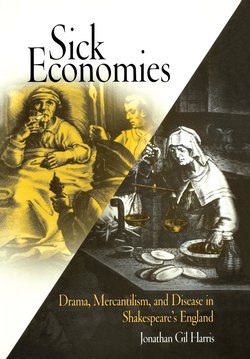Sick Economies

Реклама. ООО «ЛитРес», ИНН: 7719571260.
Оглавление
Jonathan Gil Harris. Sick Economies
Отрывок из книги
Sick Economies
Drama, Mercantilism, and Disease in Shakespeare’s England
.....
The logic of this passage is by no means mercantilist. Indeed, it arguably reproduces the premercantilist discourse of commonwealth, in which the health of the body politic is synonymous with its internally generated wealth. Economic as much as corporeal health is similarly understood here as an endogenous phenomenon, deriving from internal balance; hence even as “other renlmes” covet England’s wealth and health, the latter seem initially to be assets generated entirely within the nation.
But the play also looks ahead to mercantilist understandings of economic health and pathology as corollaries of transnational commerce. The main threats to both Wealth and Health come from two allegorical characters, Illwill and Shrewdwit, who are coded as foreigners. Shrewdwit enters speaking French (350), Illwill speaks Spanish (845–46, 851–52), and both swear Catholic oaths. These two are not the only foreign bodies who threaten England’s wealth and health. One of the interlude’s characters, and indeed its only nonallegorical figure, is a Flemish immigrant named Hans. A mercenary looking for work in England, he is presented as a loutish drunk who speaks in a virtually incomprehensible stage-Dutch. Importantly, he is also linked to economic sabotage: he boasts that wealth no longer resides in England, for “welth best in ffaunders [Flanders], it my self brought him dore” (424). The discourse of the self-contained commonwealth is eclipsed here by that of mercantilist bullionism, according to which national wealth is synonymous with money and hence transferable across countries’ borders. In order to restore health and wealth to a polity that is more nationally than universally coded, Remedy expels Hans from England, exclaiming, “There is to mainy allaunts [aliens] in this reale, but now I / good remedy haue so prouided that Englishmen shall / lyue the better dayly” (760–62). Thus is economic health reconfigured in nationalist terms as liberation from invasive foreign bodies. Yet such xenophobia anticipates the characteristic rhetorical gambit of mercantilist discourse: conflating the economic and the pathological, the play pointedly locates itself on the global stage, but within that stage, the “foreign” is deemed villainous.
.....